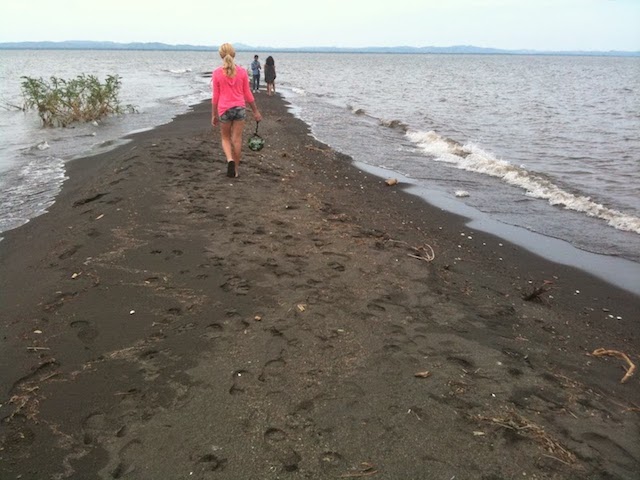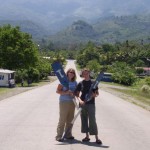When Your Tween Gets Catcalled in Nicaragua

As the grown woman in our family, somehow I thought it was only me who gets catcalled on the streets of Nicaragua.
And even then, not when my still-innocent tween daughter is in tow.
I started to notice the marked difference in attitudes between “sex object women” and “women who are mothers” when we first arrived here and I was still biking my daughter to school. In typical developing-world fashion, we rode together on one bike, her seated side saddle on the rack we’d bought specifically for school commutes. It would be a relatively peaceful ride, albeit hot, as I pedaled up the slight incline that you encounter in Granada when moving away from Lake Cocibolca.
One second I am a mother cycling her daughter to school, the next I am an object of affection for every construction worker, driver and ambling walker I pass.
On the way back from dropping her at school, the ride would be easy and slightly downhill, but it was then that the onslaughts would come. The second she left, “I lohhh yous,” the “beu-dee-fulls” — and the worst, the Latin American hiss, sort of sharp “sss” sounds — would start. It’s like clockwork. One second I am a mother cycling her daughter to school, the next I am an object of affection for every construction worker, driver and ambling walker I pass.
Like men all over the world, the men here seem to do it at the last possible moment, to me showing their cowardice — to photographer Laurie Anderson, “forcing the woman to backtrack if she should dare to object.” Her tactic was to photograph every man who catcalled her on the streets of 1970s New York. Then she made an art installation out of it. Brilliant.
Forty years later, it is still happening all around the world, and is certainly a part of life in Latin America — though a part many North American women learn to barely, seethingly tolerate. My approach is to ignore completely anyone who treats me that way. It might be part of their culture, but it is not mine, and in my mind catcallers don’t deserve any sort of reaction at all. Part of me believes Latino men do it to foreign women more, just because they love to see our reactions. So I give them none, and I try to waste as little energy as possible on this ridiculous form of attention.
She has a flash of lightning-blonde hair, and I can imagine that the men who see her passing hardly have time to recognize that she’s a mere child.
That is, until I heard it was happening to my 11-year-old too.
She told me one recent night at dinner that she’s never been brave enough to stick her tongue out at people, even from cars when she and her friends were goofing around… but now that guys hiss at her or call her baby, she’s not bashful about it anymore. Turns out, she’s been getting hissed at while in the transport car that now takes her to school, and she’s taken to using her tongue to show her disgust.
Ironically, I’ve given up biking her to school on the back of my bike, partly to avoid the heat and of course the daily hissing onslaught, and in turn, she’s the one who’s getting hissed at. She has a flash of lightning-blonde hair, and I can imagine that the men who see her passing hardly have time to recognize that she’s a mere child. Or at least I hope that’s the case, else my disgust erupt like a Nicaraguan volcano.
When Your Tween Gets Catcalled in Nicaragua
I told her my approach and reiterated my philosophy that people who give her unwanted attention or try to hook her attention for ill ends deserve none of her attention at all. I told her that boys and men who treat women with respect don’t act like that. In fact, I reminded her that I never see older men, who apparently have enough wisdom to know better, do that, and that’s because they’ve learned to respect women.
Beyond that I don’t really know what else to say, because it’s a situation that also confronts me every day.
Other times we talk about how to nail a man in the balls really, really hard with her knee if anyone ever tries to touch her. We go over my dad’s old advice that the “head goes where the nose goes,” and how to put two fingers in a person’s nostrils and pull back. I try to tell her, at the same time, that violence begets more violence, and that those tactics are only last-ditch efforts to get away, not to be used unless you really, really need to.
We talk about how to nail a man in the balls really, really hard with her knee if anyone ever tries to touch her.
Like every parent, I walk around with daily terror of the what-ifs and the fears that come with allowing your own heart to walk outside your body. In some ways Nicaragua is safer than the USA; in other ways it’s not.
I am steeled a bit by organizations such as Hollaback! and Bitch Media, where people share stories and speak out against catcalling — but alas that’s not doing me much good when my baby is getting it daily, right now, in a taxi on the way to school.
For now, I am sticking with the “ignore” tactic, trying my best to avoid trouble… but still, I ain’t gonna object to my baby’s coping strategy — the glorious, defiant, hollaback tongue.

When Your Tween Gets Catcalled in Nicaragua
Have you traveled to Nicaragua? How was your trip? Email us at [email protected] for information about sharing your experience and advice with the Pink Pangea community. We can’t wait to hear from you.
When Your Tween Gets Catcalled in Nicaragua top photo by Sam Hull on Unsplash









“Part of me believes Latino men do it to foreign women more, just because they love to see our reactions” – you are a foreign woman there so how could you know any different? It’s not only your experience though, its a generalized situation suffered by all women regardless of their looks, hair color or migration status. It’s not only in Nicaragua, it happens in the States, and in many other countries. It is a painful situation, but remember to put things into perspective.
Great article. Amazing to me that some guy named Richard seems to be the self appointed expert on all of this and has advice for you!
Less Richard. More Nicole!